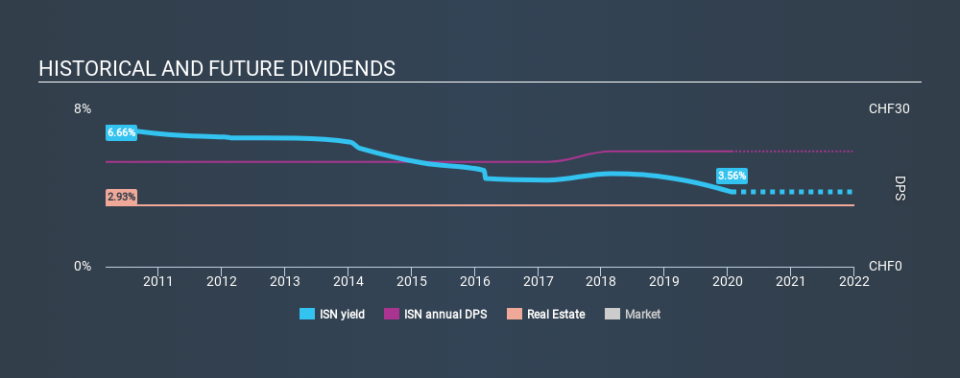Three Things You Should Check Before Buying Intershop Holding AG (VTX:ISN) For Its Dividend

Could Intershop Holding AG (VTX:ISN) be an attractive dividend share to own for the long haul? Investors are often drawn to strong companies with the idea of reinvesting the dividends. Yet sometimes, investors buy a stock for its dividend and lose money because the share price falls by more than they earned in dividend payments.
With Intershop Holding yielding 3.6% and having paid a dividend for over 10 years, many investors likely find the company quite interesting. We'd guess that plenty of investors have purchased it for the income. The company also bought back stock equivalent to around 5.4% of market capitalisation this year. Some simple analysis can reduce the risk of holding Intershop Holding for its dividend, and we'll focus on the most important aspects below.
Explore this interactive chart for our latest analysis on Intershop Holding!
Payout ratios
Dividends are typically paid from company earnings. If a company pays more in dividends than it earned, then the dividend might become unsustainable - hardly an ideal situation. So we need to form a view on if a company's dividend is sustainable, relative to its net profit after tax. Intershop Holding paid out 34% of its profit as dividends, over the trailing twelve month period. This is a middling range that strikes a nice balance between paying dividends to shareholders, and retaining enough earnings to invest in future growth. One of the risks is that management reinvests the retained capital poorly instead of paying a higher dividend.
In addition to comparing dividends against profits, we should inspect whether the company generated enough cash to pay its dividend. Unfortunately, while Intershop Holding pays a dividend, it also reported negative free cash flow last year. While there may be a good reason for this, it's not ideal from a dividend perspective.
Is Intershop Holding's Balance Sheet Risky?
As Intershop Holding has a meaningful amount of debt, we need to check its balance sheet to see if the company might have debt risks. A rough way to check this is with these two simple ratios: a) net debt divided by EBITDA (earnings before interest, tax, depreciation and amortisation), and b) net interest cover. Net debt to EBITDA is a measure of a company's total debt. Net interest cover measures the ability to meet interest payments. Essentially we check that a) the company does not have too much debt, and b) that it can afford to pay the interest. With net debt of 3.55 times its EBITDA, investors are starting to take on a meaningful amount of risk, should the business enter a downturn.
Net interest cover can be calculated by dividing earnings before interest and tax (EBIT) by the company's net interest expense. Intershop Holding has interest cover of more than 12 times its interest expense, which we think is quite strong.
Consider getting our latest analysis on Intershop Holding's financial position here.
Dividend Volatility
One of the major risks of relying on dividend income, is the potential for a company to struggle financially and cut its dividend. Not only is your income cut, but the value of your investment declines as well - nasty. Intershop Holding has been paying dividends for a long time, but for the purpose of this analysis, we only examine the past 10 years of payments. The dividend has been stable over the past 10 years, which is great. We think this could suggest some resilience to the business and its dividends. During the past ten-year period, the first annual payment was CHF20.00 in 2010, compared to CHF22.00 last year. Dividend payments have grown at less than 1% a year over this period.
While the consistency in the dividend payments is impressive, we think the relatively slow rate of growth is unappealing.
Dividend Growth Potential
Dividend payments have been consistent over the past few years, but we should always check if earnings per share (EPS) are growing, as this will help maintain the purchasing power of the dividend. It's good to see Intershop Holding has been growing its earnings per share at 19% a year over the past five years. Earnings per share have been growing at a good rate, and the company is paying less than half its earnings as dividends. We generally think this is an attractive combination, as it permits further reinvestment in the business.
Conclusion
To summarise, shareholders should always check that Intershop Holding's dividends are affordable, that its dividend payments are relatively stable, and that it has decent prospects for growing its earnings and dividend. Intershop Holding has a low payout ratio, which we like, although it paid out virtually all of its generated cash. We like that it has been delivering solid improvement in its earnings per share, and relatively consistent dividend payments. Overall we think Intershop Holding is an interesting dividend stock, although it could be better.
Are management backing themselves to deliver performance? Check their shareholdings in Intershop Holding in our latest insider ownership analysis.
Looking for more high-yielding dividend ideas? Try our curated list of dividend stocks with a yield above 3%.
If you spot an error that warrants correction, please contact the editor at editorial-team@simplywallst.com. This article by Simply Wall St is general in nature. It does not constitute a recommendation to buy or sell any stock, and does not take account of your objectives, or your financial situation. Simply Wall St has no position in the stocks mentioned.
We aim to bring you long-term focused research analysis driven by fundamental data. Note that our analysis may not factor in the latest price-sensitive company announcements or qualitative material. Thank you for reading.

